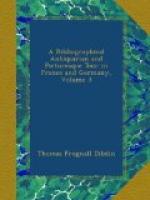The prospect within doors was not quite of so gratifying a description. It seemed to be the mere shadow of a library. Of old books, indeed, I saw nothing worth noticing—except a white and crackling, but cropt, copy of Ratdolt’s Appian of 1478, (always a beautiful book) and a Latin Version of Josephus, printed at Venice in 1480 by Maufer, a citizen of Rouen. This latter was really a very fine book. There was also Ratdolt’s Euclid of 1485—which indeed is every where abroad—but which generally has variations in the marginal diagrams. Of Bibles, either Latin or German, I saw nothing more ancient than the edition by Sorg, in the German language of the date of 1477. I paused an instant over the Tyturell of 1477, (the only really scarce book in the collection) and threw a gilded bait before the librarian, respecting the acquisition of it;—but M. Klein quite screamed aloud at the proposition—protesting that “not a single leaf from a single book should be parted with!” “You are quite right,” added I. “My guide eyed me as if he could have said, “How much at variance are your thoughts and words!” And yet I spake very sincerely. Mr. Klein then placed a clean, but cropt, copy of the first Aldine Pindar before me; adding, that he understood it to be rare. “It is most rare,” rejoined I:—but it is yet “rarer than most rare” when found UPON VELLUM!—as it is to be seen in Lord Spencer’s library.” He seemed absolutely astonished at this piece of intelligence—and talked about its pecuniary value. “No money can purchase it. It is beyond all price”—rejoined I. Whereupon my guide was struck with still deeper astonishment.
There were all the Polyglott Bibles, with the exception of the Complutensian; which appears to be uncommon in the principal libraries upon the continent. Walton’s Polyglott was the Royal copy; which led to a slight discussion respecting the Royal and Republican copies. M. Klein received most implicitly all my bibliographical doctrine upon the subject, and expressed a great desire to read Dr. Adam Clarke’s Essay upon the same. When I spoke of the small number of copies upon LARGE PAPER, he appeared to marvel more than ever—and declared “how happy the sight of such a copy would make him, from his great respect for the Editor!” There was a poor sprinkle of English books; among which however, I noticed Shakspeare, Milton, Swift, and Thomson; I had declared myself sufficiently satisfied with the inspection of the library, when dinner was announced; but could not reconcile it to myself to depart, without asking “whether they had the Tewrdanckh?” “Yes, and UPON VELLUM, too!” was the Librarian’s reply. It was a good sound copy.




